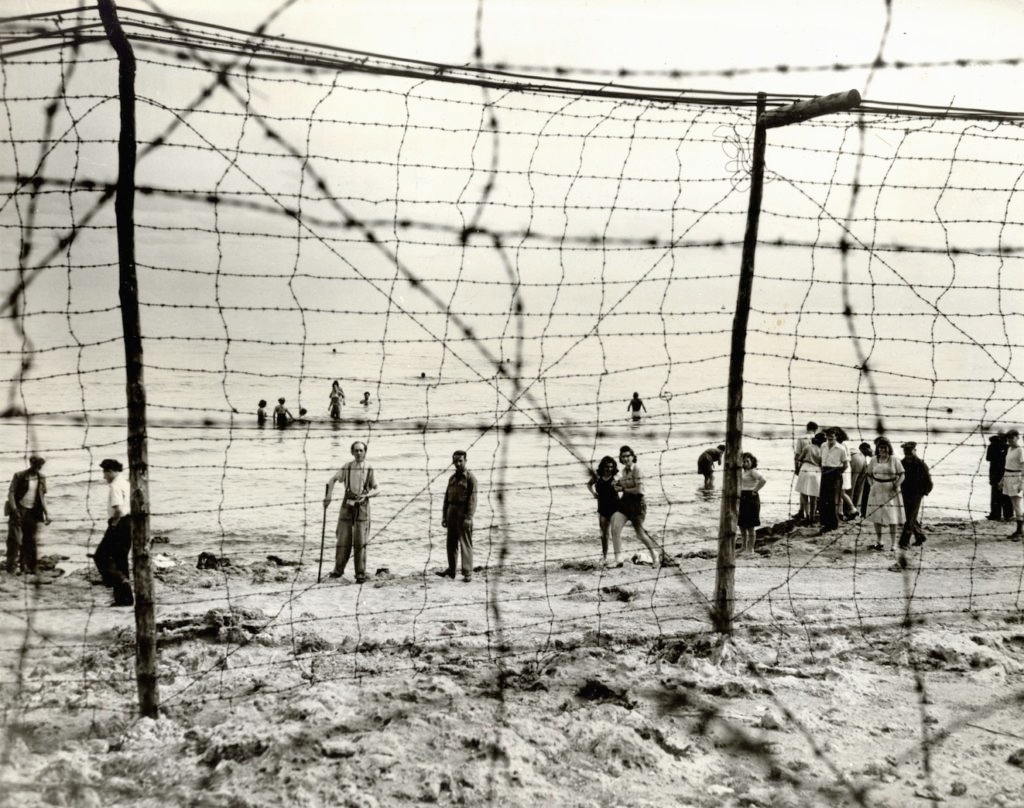From the Archive: A Jewish tunnel to Israel
Published August 1, 2014

A group of Jewish refugees in a British detention camp in Cyprus swim in the Mediterranean Sea behind a barbed wire fence that surrounds the camp, 1946. The refugees were permitted use of the beach from 10 a.m. to 5 p.m. daily. (Courtesy JDC Archives)
ADVERTISEMENT
Destroying Hamas’ extensive and sophisticated network of tunnels has become the primary focus of the Israel Defense Forces’ operation in Gaza. In the 194os, however, Jews were digging their own tunnels.
In August 1948, British engineers blew up a Jewish-built tunnel in colonial Cyprus. The underground corridor was designed not for terror attacks but to facilitate immigration to Israel. While the Cyprus tunnel did not, of course, lead all the way to the newly declared State of Israel, it was the first leg of a journey, followed by an under-cover-of-night voyage:
The tunnel–30 yards long and two feet wide–had been completed only two days before it was discovered last week, It ran under the barbed wire surrounding one camp to a point well beyond the guard perimeter. The detainees had wired the tunnel with electric light with current obtained from a searchlight tower, British authorities believe that it took the Jews six months to dig the tunnel. Twenty-nine refugees were sentenced to various terms of imprisonment, ranging up to nine months, when the passage was discovered last week.
It was reliably estimated here today that at least 100 Jewish detainees succeeded in escaping from Cyprus last week. British officials on the island voiced the opinion that Jewish representatives outside the camps, stationed in Cyprus, but who are in radio contact with Israel, are attempting to help “selected male specialists among the refugees” to escape on small boats which are brought near the Cyprus coast at night.

Men and women washing their clothing on laundry day at camp 60 in Cyprus, December 1946. (Courtesy JDC Archives)
You might think the Cyprus detention camps, which housed tens of thousands of Holocaust survivors and other Jewish refugees the British had barred from entering Palestine, would have already closed by August 1948, which was a full three months after the British Mandate ended and the State of Israel was declared. However, the British — who did not want to alienate the Arabs by helping supply Israel with soldiers for its ongoing War of Independence – continued to intern and guard thousands of military-age Jewish men until January 1949.
Although only military-age men were being forced to stay, many women and children stayed as well in order to avoid dividing the family. As JTA noted in August:
Last week the one hundredth Jewish baby was born on Cyprus and many more are due soon. Many expectant mothers refuse to go to the hospital until the last minute, hoping that the baby will be born in Israel.

A woodworking class in the trade school established and funded by the American Jewish Joint Distribution Committee at a Cyprus detention camp in 1947. Chairs, tables, and benches were constructed for use by the detainees. (Courtesy JDC Archives)
During this time, the American Jewish Joint Distribution Committee continued to provided services, including vocational training and recreational programs, for the camps’ Jewish residents. [The photos accompanying this post are all courtesy of the JDC Archives, which displays an entire gallery of camp photos on its website.] Meanwhile, Jewish leaders mounted a legal challenge, which JTA described:
The legal basis of the test will be whether the government is competent to detain the Jews since the end of the British Mandate in Palestine on May 15, whether the Jews here are Israeli citizens and, if so, whether the British can legally detain citizens of another state trying to reach that state.
The case neared victory on Dec. 12, when a judge issued an order requiring the commander of the Xylotymbou camp to appear before the Cyprus Supreme Court to “show cause why 5,164 Jews [the military-age men] now held should not be released,” JTA reported.
A month later, British Foreign Secretary Ernest Bevin announced that all remaining internees would be released, and on Jan. 24, JTA reported on the first boatload, whose 1,500 passengers including 110 infants, fortunately needed no tunnel to reach :
British troops assisted the Jews in boarding the vessel and in loading their baggage into the holds. A holiday atmosphere pervaded the entire operation, with the Jews demonstrating no resentment toward their former jailers. In the camps every tent and Nissen hut is jammed with home-made boxes and suitcases in which freshly washed and patched clothing and other personal possessions have been packed in anticipation of the entry into Israel, goal of a voyage which in some cases began two years ago.
![]()














